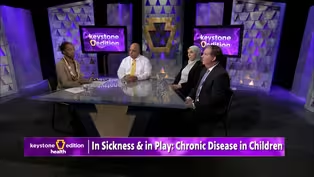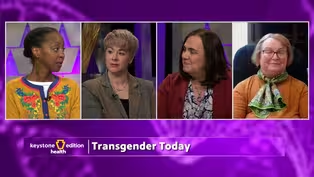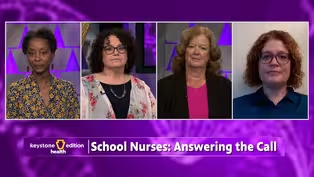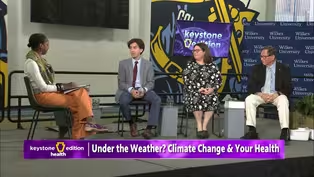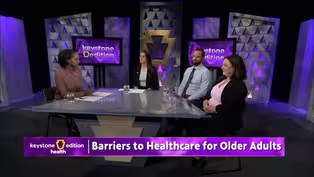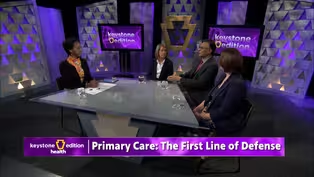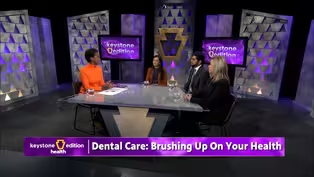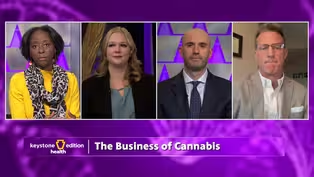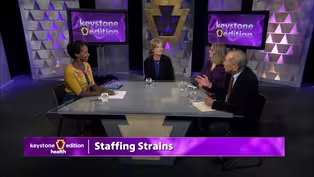Keystone Edition
Obesity: Weighing the Options
10/16/2023 | 27mVideo has Closed Captions
Obesity is a serious risk factor many try to avoid when developing healthy eating habits.
Finding a helpful regiment when healthy eating can be difficult for some, when on budget, or overall not be easy to follow. Obesity is a serious risk factor many try to avoid when developing healthy eating habits. Who or where does one go to find help with all of this? Who can give tips or teach different methods? Find out how to approach and answer all these questions and more.
Problems playing video? | Closed Captioning Feedback
Problems playing video? | Closed Captioning Feedback
Keystone Edition is a local public television program presented by WVIA
Keystone Edition
Obesity: Weighing the Options
10/16/2023 | 27mVideo has Closed Captions
Finding a helpful regiment when healthy eating can be difficult for some, when on budget, or overall not be easy to follow. Obesity is a serious risk factor many try to avoid when developing healthy eating habits. Who or where does one go to find help with all of this? Who can give tips or teach different methods? Find out how to approach and answer all these questions and more.
Problems playing video? | Closed Captioning Feedback
How to Watch Keystone Edition
Keystone Edition is available to stream on pbs.org and the free PBS App, available on iPhone, Apple TV, Android TV, Android smartphones, Amazon Fire TV, Amazon Fire Tablet, Roku, Samsung Smart TV, and Vizio.
Providing Support for PBS.org
Learn Moreabout PBS online sponsorshipMore from This Collection
Healthcare is constantly changing as technology finds new and better ways to help people live longer, healthier lives. Host Tonyehn Verkitus will address the issues that are important to the people in our community, including the ongoing pandemic, concerns about vaccines, food deserts, childhood trauma and child abuse, mental health, environmental issues, and the rising cost of staying healthy wit
Domestic Violence: Breaking the Silence
Video has Closed Captions
Access to the right resources can make facing this challenge a little easier for families (26m 59s)
In Sickness and in Play: Chronic Disease in Children
Video has Closed Captions
About 25% of children in the US aged 2 to 8 years have a chronic health condition (27m)
Video has Closed Captions
Homelessness can happen to anyone at any age or socio-economic status. (26m 59s)
Video has Closed Captions
As we raise the visibility on Transgender young adults and embrace them within our culture (26m 59s)
School Nurses: Answering the Call
Video has Closed Captions
What can our school districts do to help retain and recruit nurses for future generations? (27m)
Under the Weather? Climate Change & Your Health
Video has Closed Captions
How does climate change impact individual and public health? (54m 59s)
Barriers to Healthcare of Older Adults
Video has Closed Captions
What progress have local organizations made in addressing these challenges? (27m)
Primary Care: The First Line of Defense
Video has Closed Captions
When was the last time you saw your primary care doctor? (27m)
The Smallest Victims: Child Abuse & Trafficking
Video has Closed Captions
What are the signs to know to spot child abuse and even possible trafficking? (27m)
Dental Care: Brushing Up on Your Health
Video has Closed Captions
How can providers make dental care more affordable and accessible? (26m 59s)
Video has Closed Captions
What does the cannabis industry mean for Northeastern and Central Pennsylvania? (26m 59s)
Video has Closed Captions
Low staffing levels can lead to burnout among healthcare workers (27m)
Providing Support for PBS.org
Learn Moreabout PBS online sponsorship- [Announcer] Live from your public media studios, WVIA presents, "Keystone Edition Health", a public affairs program that goes beyond the headlines to address issues in northeastern and central Pennsylvania.
This is "Keystone Edition Health".
And now, moderator Tonyehn Verkitus.
- Good evening, and welcome to "Keystone Edition Health".
I'm Tonyehn Verkitus.
Thank you for joining us tonight.
Tonight we'll hear from our panel of experts about the importance of eating healthy and avoiding obesity.
But first, WVIA's Sarah Scinto has more.
(whooshing sound effect) - [Sarah] According to the Institute for Public Policy and Economic Development Indicators Report, the adult obesity rate in northeastern Pennsylvania is around 33%.
Nationally, 41.9% of adults are considered obese.
Obesity often results from taking in more calories than are burned by exercise and normal daily activities.
It occurs when a person's body mass index is 30 or greater.
The main symptom is excessive body fat, which increases the risk of serious health problems including high blood pressure, heart disease, diabetes, and stroke.
Treatments for obesity include dietary changes, exercise, weight loss medications, and surgery.
For "Keystone Edition Health", I'm Sarah Scinto, WVIA News.
- Joining us tonight we have Michele Orrson from The Greenhouse Project, April Rudat, registered dietician, and Marlee L. Stefanelli from Stefanelli Counseling Services.
Thank you all for joining us.
- Thank you.
- Thank you.
- Marlee, let's start with you.
Could you tell us a little bit about your services and how they support people who may have some sort of eating disorder?
- Yes, so I focus on the psychological aspect of people's relationship with food.
I think that oftentimes, it's the psychological aspect that gets overlooked and missed in understanding that there's multiple factors that contribute to the development of obesity.
And that a lot of times it's about people's relationship with food and relationship with their body, and that those aspects need to be treated in order to sustain long-term change.
- And Michele, can you tell us a little bit about your work at The Greenhouse Project?
- Sure, so The Greenhouse Project has a number of different programs that promote health related to activity, but certainly about eating healthy.
I run a program called Empowered Eating, and we meet third Thursday of every month.
And it's really to talk about how to eat healthier, particularly eating more plants in your diet.
And it also gives community and support for people who are trying to make dietary changes.
- And can anyone attend these meetings?
- Anyone can attend.
They are open to the public.
We generally do ask for registration through email, just so we can have an idea of how many people are coming, because we always have treats.
So I think it's important for people to understand that healthy food can also be delicious.
So we like to make sure we have samples.
So the registration makes sure we have enough for everyone who attends.
- April, as a dietician, you probably see lots of different types of folks.
Can you tell us a little bit about your work and maybe why you got into that work?
- Mm-hmm, so, I decided I wanted to be a registered dietician nutritionist in seventh grade.
It's very rare that people know that early on in their life what they want to do.
My mother will kill me for saying this, but she was a chronic dieter, and it led her to body dissatisfaction and self-loathing.
And as a young girl, it made me really sad.
So as a result, it became a career aspiration.
In my mind, I always wanted to treat eating disorders, but ultimately I worked in community health and hospital populations, as well as in public health in Allentown, and found that when people came in to see me with weight concerns, most of the time they had disordered eating patterns.
So they would engage in behaviors like restricting their food intake or cutting out entire food groups, and it would only lead to weight regain, plus more.
And that's what research shows with every diet.
People may lose weight, but in the end they regain all the weight they lose, back to their body's natural weight plus more to protect against future starvation.
So the more I worked with people, the more interested I became in disordered eating in all weights, shapes, walks of life.
- So, you mentioned fad diets.
There's a lot out there.
Why do they become so popular and how can we warn people against them?
- Yeah, but fad diets are sexy.
You see those before and after pictures, and it looks easy.
I think every new diet is like a new love, it's like a new relationship.
But the more and more people diet, the more they stop working over time.
So that's where it tends to impact relationship with food.
It stops working.
So then people seek the next thing.
They seek the next approach, whether it's low-carb or counting macros or counting calories.
And that leads a person farther away from trusting their body and being able to be attuned or listening to their body.
So over time, distrust becomes a problem and leads people to body image dissatisfaction.
- I also think that in our society, we associate so many like beneficial things with eating healthily or with weight loss, and that so people are drawn to fad diets because they want to try to achieve all those things that they associate or they think will be different about their life if they were to lose weight.
- Right, so speaking of healthy eating, you mentioned a plant-based diet.
- [Michele] Yes.
- What exactly would a plant-based diet be?
- So there's a whole continuum of plant-based diets.
Everything from, you know, vegetarian and vegan, whole-food plant-based is really about just making sure you're eating food in its most natural forms, minimally processed, right, trying to avoid cooking with lots of extra oil and things like that.
But at the Empowered Eating program, we try to meet people where they're at, and it's always sort of moving along that continuum.
How do we keep incrementally making improvements to our diet?
I think it's unrealistic to think that people can, you know, adopt a plant-based diet immediately.
So how do we help support them and educate them and give them the tools that they need to do that?
- So when we say plant-based diet, are we talking like a raw food diet, or are these cooked foods?
'Cause I know a lot of times people think it's really difficult to have a plant-based diet, or it could be expensive.
- Yeah, actually, I'm all for cooked foods.
I think a raw diet, while there are advocates for it, certainly, I think that one's sort of unsustainable over the long-term.
But it's actually cheaper to eat a plant-based diet than it is to eat, you know, a diet filled with meat.
I think the last statistic I saw said $700 a year cheaper to eat a plant-based diet.
And again, I think that's where education comes into play.
I do offer a program, I call it Plant-Based 101, and we will offer that in January, that talks about some of the myths of plant-based eating.
And certainly the fact that it's hard, or that it's expensive, that it's boring, those are all myths that we try to eliminate in that conversation.
- Marlee, you mentioned relationships with food.
Can you talk a little bit more about that?
I'm curious to try to understand how people feel that they're replacing regular relationships with food.
- Yes, that people often will go to food to meet different types of emotional and relational needs.
Like, such as like a sense of safety or a sense of control, even a sense of soothing, sometimes a sense of identity, because it's easier.
Foods can't do anything, right.
They can't, food can't hurt them.
So they're a lot, they're not as risky, that doesn't require the same vulnerability that a relationship with a person would.
And so they can kind of, you know, use the food in a way that there's kind of an illusion of safety associated with that.
And they could kind of do it the way they want to do it.
You know, I can either overeat or I can undereat, you know, they can kind of manipulate it the way that they want to, so that, you know, it starts to take the place and try to fulfill those emotional and relational needs for them.
- So this is interesting, because obviously we're talking about obesity, but it sounds like the psychology for the whole spectrum is sort of the same?
- Yes, yeah.
I always say if you were like recording my sessions, you would have no idea what kinds of eating rituals or eating behaviors people engage in if they didn't specify it.
Because it all, the psychology of it all sounds the same.
- I'd like to go back to not necessarily the fad diets, but there's obviously lots of weight loss clinics around.
I know someone in particular who did lose a lot of weight.
The place shut down, and she and her partner gained it all right back.
Why is this such a problem here?
Because it seems that these places come and go.
- Yeah, our culture values thinness.
We're an appearance-based society, and people, especially with the dawn of social media, people really place a lot of worth on what they look like.
They feel they're unlovable if they don't look a certain way.
So a lot of times, people believe that by changing the way they look, they'll find connection, they'll find happiness, when in fact there is no single research study to date that shows that anyone has ever become happy or, you know, felt confident for that matter in changing their weight or losing weight or changing their body.
So I think that's the allure.
It's that, "If I change, I'll feel happy or I'll like myself better."
There are some things that we know to be true.
If a person is in a leaner body, they have a privilege of being able to sit at the Penn State stadium, in a movie theater, comfortably on an airplane.
And those are, I believe, discriminatory practices.
I know sometimes, I'm a smaller person, and I have a hard time fitting on a plane seat.
So in ways, it's easier to be in a smaller body, but it certainly doesn't necessarily make a person happier or more confident.
That's a message I deliver a lot.
And I think that's the allure of some of these fad diet clinics is let's show the before and after picture and show you how happy you'll be in the end.
The truth is the starvation it takes, the rituals that Marlee mentioned that it takes to lose all that weight, it's rigid.
It matches up a lot with obsessive-compulsive disorder, you know, very ritualistic.
"I'm gonna count my calories, I'm gonna count my macros, I'm gonna weigh my food on a food scale.
I'm gonna do all these things to create this new body."
And ultimately, this belief is that it's gonna make a person happy, but it doesn't.
I think one thing that people fail to recognize is that you can't be happy if you don't eat.
You can't be happy if you don't eat.
So it leads to misery.
And then like two final conclusions is either (A) they lose the weight, they're scared to death of gaining it back, or they find flaws even with the weight loss.
"I need to fix this, I don't like this, I don't like that."
So I don't think in any case, it ever leads to happiness, even though there's that allure from these businesses: "You'll be happy, your life will be fulfilled."
- But I'm assuming you've both seen people come to you from these clinics.
You're obviously a dietician, registered, you're a counselor.
These clinics, do they have any sort of certification?
Do they have any laws that govern them?
- Very good question.
Oftentimes, no.
- Okay.
- And in the state of Pennsylvania, registered dietician nutritionists, we have an act that has protected the title, only registered dietician nutritionist or a licensed dietician nutritionist.
So there are people out there that call themselves nutritionists or call themselves dieticians, and they're not credentialed.
So that's something for people to be aware of.
Your dog can call themselves a dietician or a nutritionist, just not a licensed dietician nutritionist.
So it gets really scary.
People are out there health coaching, they're not even using the terminology and they're causing a lot of harm.
So, you know, I think that's really problematic with these businesses.
- Absolutely, and then sometimes when people come to see me and I want to refer them to a licensed dietician, you know, they're resistant, 'cause they had all these bad experiences and they think that it's gonna be like that.
And then, you know, I'm trying to educate them on how going to see someone like April is a much different experience than going to see these people who do not have the same training, education, background, continuing education requirements that April does.
- So I'd like to come back to the Whole Foods 101.
- [Michele] Yeah.
- When people come to you, are they often coming to the program because of a medical condition?
Might it be because of a weight issue?
And then how do they process through the program?
Do people stay with you, or once they're understanding how to make their- - So I think it's a mixed bag.
I think it's people who maybe are fighting chronic illnesses that are trying to have a healthier diet just to help manage inflammation and pain, and, you know, maybe they're trying to manage diabetes better.
So it's not the same people through the program every month.
So it is, you know, depending on the topic, we could have 10 people show up, we could have 40 people show up.
So it depends on the different topics that we're covering.
But primarily, we're talking about what are the tools, how to meal plan, 'cause I think planning is so important to success, right?
It's about building tools and lifestyle changes that allow you to be successful in changing your diet.
So I think it's definitely a mix of people who come.
And then generally, after the sessions, I'll have one-on-one conversations with people to help answer specific questions and needs that they have.
- Are you helping with meal planning as well?
- Yeah, I individualize my approach with each patient.
Everyone comes in with their own story, their own likes and dislikes, their own stage in terms of where they are with healing their relationship with food.
So one of the first things we do is educate on nutritional adequacy and balance.
So eating every three to five hours, creating the MyPlate model, which includes a fruit or vegetable, a grain or starch, and a protein source.
And that has been shown in research to keep us full for a couple of hours, including healthy fats.
And so I'll work through that model usually in my second session with people, using foods that they enjoy.
There's an interesting thing, all foods fit in balance.
So I will talk about how restriction leads to binging.
So if a person restricts from cookies, for example, they find themselves giving in eventually and eating the whole sleeve of cookies.
So I'll help them work in play foods, which is a term coined by the intuitive eating research.
You know, we all need to play in balance.
So we'll call these foods play foods, not junk foods, which can make people feel bad about eating them.
If they want a cookie, we put a cookie with their meal.
And there's some interesting research on that.
One study done on women that struggle with weight concerns and polycystic ovarian syndrome, the dieticians conducting the research wanted to look at if we gave them a sweet every day, would they stop binging, because the binging was affecting their insulin levels.
And sure enough, after the end of the research study, all of their insulin levels has lowered in giving them a sweet every single day.
That is beautiful, and they kind of prove the doctors wrong who are telling the patients, "Don't eat sweets."
- [Tonyehn] Yeah.
- That backfires.
- We're actually covering sweets in our October session.
- Okay - We're gonna have Chef Donna from Maximum Zen Bakery come and you know, teach how to maybe bake and eat sweets maybe in a more healthy way.
So maybe it's not gobs of sugar, but it's, you know, how can you substitute with dates or other sweeteners, honeys and things like that that may have you know, a lower glycemic index or just if you're eating a date, you're getting sweet and fiber.
So we're going to talk about sweets, because it is important, yeah.
- I do love the idea of calling it play food as opposed to junk food.
- Yes.
- Because when I say junk food to myself, I automatically feel guilty.
- Yes, right.
- So I'm gonna steal that.
- And it reinforces the morality issue that we have associated with food, that there's good and bad food, right?
Like you don't hear the word junk and think good, you think bad.
And so then when people eat these types of foods, they start to think that they're bad, and then this morality issue starts to happen.
- I'm also curious to know the age of your clients.
Do you find that you have more older clients?
Do you have a lot of teenagers coming in?
'Cause I would, I always think of teenagers as being the one who have some sort of eating disorder.
- Mm-hmm, so there's actually a really wide range.
I've had clients as young as 10, and you know, I have clients into their 60s.
Like April and I share a client that's in her later 60s right now.
And so there is a wide range.
You know, one of the risk factors for the development of any type of eating issue is major life changes.
So you could see how in teenage years, there's a lot of major life changes.
You're dealing with puberty and changes in schools and a lot of social stuff.
So, but also going away to college and then getting married, having kids, divorces, you know.
So all these different life changes that happen at different stages of the life cycle can kind of bring things on or help things resurface.
- Okay.
Can we talk a little bit about BMI, because I get that letter from school every year.
(group laughs) Apparently, my kids' is too low.
But why, where did that come from?
- I was actually working at the Allentown Health Bureau many years ago, 2001, and that is when there was a principal that was working with the health departments in the state of Pennsylvania to create that.
So I remember feeling when that first came out like it was a bad idea.
Their selling point was, "We're going to capture eating disorders."
So I thought that was good.
But you know, I don't think they thought through fully the ramifications of that child in a larger body opening up that letter before it came home to mom or dad or guardian seeing, "Your child is obese."
That's so damaging, and labels can be so damaging and so harmful.
So that's why when Marlee and I especially work with people, we're kind of not using the phraseology obesity, or overweight.
You'll notice I just referred to people in larger bodies.
It's so stigmatizing.
Even my sister, you know, she's had a lot of health issues and started walking during the pandemic and eating well.
She goes to the doctor and she's told, "Oh, you're in the obese range," and she's never been healthier.
She said, "It made me feel terrible."
- [Tonyehn] Yeah.
- So I think those letters and BMI in general is harmful.
And really, if you look at the history, it was the 1830s, this Belgium mathematician was looking at population data in Belgium.
And he was looking at white males and he developed a bell curve.
And from that bell curve, he developed the BMI mathematical calculation, which later the New York Metropolitan Life Insurance Company looked at in terms of, "Let's look at these numbers and create labels, underweight, normal weight, overweight, obese, and let's, you know, use that to charge people for insurance premiums."
So it's rooted in, you know, not the best interest of people.
One last fact: people who are overweight live the longest.
People who are obese live as long as those who are in normal weight bodies per BMI, and people who are underweight have the shortest lifespans and a lot of medical issues.
And again, I think our society really glamorizes thinness, but thin people or underweight people may not live as long.
- That is so interesting.
I have to admit, there's people I've met who are way healthier than I am, but they might be in a larger body.
So how do we glamorize that, or how do we help people understand that it's not about the weight, it's about what you're eating maybe or the amount of exercise that you're getting, and how do you share that with clients?
- That's key from research.
Some recent studies in the past two years have come out that people who move their bodies and exercise actually have the best longevity and the lowest chronic disease risk.
So that's the most helpful.
And one final message about that is that we come in all different weights and shapes.
All life forms, plants and animals, have diverse bodies.
- And I also think that it's thinking about the purposes of the food that you're eating.
You know, if people are using food for emotional purposes, whether they're normal weight, overweight, or underweight, that is likely unhealthy and maladaptive for them.
- Are there any warnings signs... You were about to say something, sorry, go- - No, I was just gonna say, I think when you're eating, if you're focusing on eating for health, and stop thinking about eating for weight, the weight sort of adjusts itself, in some ways.
You know, you really just focus on, "What I'm eating, is it helping me?
Is it healing me or is it hurting me?"
And I think that mindset, I know for me, it helped a lot in my own medical journey to just think about is this something that is doing good for my body, right?
And just focusing on that health aspect.
And I think, you know, the weight will adjust itself.
- Okay, so if there were warning signs that anyone should be looking for, a parent, yourself, what are a few that you would give?
- You know, the first thing that I always suggest to people that they really start to think about first is what is the purpose of this eating behavior?
Am I eating for hunger, or am I eating for emotional hunger?
And that if they're eating for emotional hunger, that that's something that they may want to think about trying to deal with in a different way.
Because food can never meet that emotional need, right?
Nothing internal changes through eating.
And so they'll just have to keep going back to it and back to it and it becomes this cycle.
- Do you have a warning?
- Yeah, I think that if people are cutting out entire food groups.
A lot of young kids I work with that want to lose weight will, they'll weigh their food on a food scale, they'll count every calorie in an app, they will follow a diet from someone on social media, Instagram, TikTok, you know.
So if parents are noticing or family members are noticing that somebody is engaging in these changes that can lead to health detriment, then those are warning signs.
And blood work is a great telltale sign.
How are the cholesterol labs?
How are the kidney levels?
How are the liver labs?
You know, blood work tells us a lot about nutritional status.
- It seems to me that one of the things we should be thinking about is that we're actually enjoying eating when we're eating, but also with a healthy mindset.
If you have to weigh your food, or if it's a chore to think about what you're going to eat that day, then it's probably not right.
I'd like to thank you and thank all of our guests for their insights and all of you for joining us.
For "Keystone Edition Health", I'm Tonyehn Verkitus.
Have a good evening.
(pleasant music) (heartbeat monitor beeps) (pleasant music continues) (heartbeat monitor beeps) (pleasant music continues) (heartbeat monitor beeps) (pleasant music continues) (heartbeat monitor beeps) (pleasant music continues) (heartbeat monitor beeps) (pleasant music continues)
Obesity: Weighing the Options - Preview
Preview: 10/16/2023 | 30s | Watch Monday, October 16th at 7pm on WVIA TV (30s)
Providing Support for PBS.org
Learn Moreabout PBS online sponsorship
- News and Public Affairs

Top journalists deliver compelling original analysis of the hour's headlines.

- News and Public Affairs

FRONTLINE is investigative journalism that questions, explains and changes our world.












Support for PBS provided by:
Keystone Edition is a local public television program presented by WVIA

